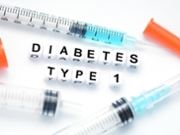|
|
 
|
A real-world study involving about 43,000 adults was presented at the annual meeting of the American College of Gastroenterology and found that tirzepatide was associated with lower risks of death, hospitalization and major cardiovascular events compared with semaglutide in patients with metabolic dysfunction-associated steatotic liver disease, obesity and type 2 diabetes.
|
|
| |
 |
| (Adrian825/Getty Images) |
Adolescents and young adults with autoimmune diseases are more than twice as likely to develop type 1 diabetes compared with those without autoimmune diseases, according to a study in Diabetes Care that analyzed data from more than 1.4 million people. "We need to increase awareness to specific risk factors and clinical scenarios that are associated with higher risk for type 1 diabetes, and that require additional workup to better differentiate between the various etiologies of hyperglycemia," says researcher Dr. Amir Tirosh. |
|
SGLT-2 inhibitors were associated with a lower risk of autoimmune rheumatic diseases compared with sulfonylureas in patients with type 2 diabetes, according to a study published in The BMJ. Data from more than 2 million patients showed an incidence rate of 51.90 per 100,000 person-years for those using SGLT-2 inhibitors, compared with 58.41 per 100,000 person-years for those using sulfonylureas. |
|
|
 | Unprepared for AI: The Retail Transformation
AI is transforming retail, but most retailers are unprepared. Join EPAM, Stripe, and commercetools on November 12 at 12 PM EST to learn how AI is redefining the shopper journey and why composability is key to responsible adoption. Register now to build an AI-ready commerce foundation. |
|---|
| |
|
|
 
| |
 |
| (Pixabay) |
A study in JAMA Network Open suggests sleeping in total darkness may lower the risk of cardiovascular disease. Participants exposed to the brightest light at night had a significantly higher risk of heart failure, coronary artery disease and stroke. The study tracked nearly 89,000 people using wrist wearables to monitor light exposure. Sleeping in the dark may help: A lack of light exposure while sleeping was associated with benefits even when factors such as shift work, diet and physical activity were taken into account. |
|
|
The release of new US dietary guidelines has been delayed, tentatively to December, due to the government shutdown. The guidelines, updated every five years, influence federal nutrition programs and school meals. HHS Secretary Robert F. Kennedy Jr. has said the guidelines will emphasize whole foods and increased saturated fats, a significant shift from current recommendations.
|
|
An animal study in the journal Brain Medicine suggests that exercise can reduce depressive and anxiety-like symptoms linked to a high-fat, high-sugar diet. Researchers found that exercise helped normalize insulin and leptin levels and reduced the decline in gut microbiome metabolites that are important for brain health. |
|
A study in Free Radical Biology and Medicine shows that drinking beetroot juice twice daily may lower blood pressure in adults ages 67 to 79. The juice's high nitrate content can boost nitric oxide levels, relaxing blood vessels and improving circulation. |
|
|
 | The Future of Retail: What's Coming in 2026
AI personalization and seamless customer experiences defined 2025, but the retail landscape is about to shift again. Join us on November 5th for a fast-paced webinar where industry experts reveal the top trends and technologies shaping 2026. Discover how to stay ahead, boost productivity, and deliver next-level shopping experiences. Register now! |
|---|
| |
|
|
 
|
The treatment of cardiometabolic disease has advanced significantly over the past 20 years, experts said at the 20th Cardiometabolic Health Congress. "There is a tremendous amount going on," said Dr. Christie M. Ballantyne, chief of the section of cardiovascular research at Baylor College of Medicine. "It's extraordinary to me, in terms of 20 years ago, there were two disorders that we could not treat at all. ... This is just the beginning."
|
|
|
Maintaining a high level of satisfaction among patients means paying attention to their needs before, during and after their visits. A Q&A offers practical tips that offices and teams can implement to improve patient communication, access and experiences. Staff engagement, wait times, online reviews and satisfaction measures are examined.
|
|
|
|
Free eBooks and Resources
|
 
| ICYMI: The Most Popular Stories From Our Last Issue |
|
|
Healthgrades released its annual list of the top hospitals for outpatient and 16 specialty care areas. The rankings are based on outcomes data from about 4,500 hospitals from 2022 through 2024, adjusted for comorbidities. NewYork-Presbyterian Queens, Morristown Medical Center and NYU Langone Hospitals are among the top, as are Johns Hopkins Hospital and Mission Hospital.
| | | | | |
